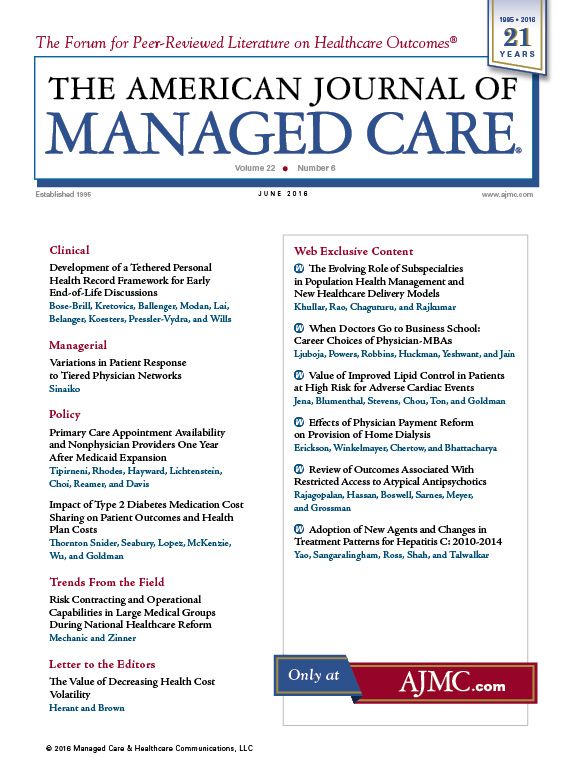- Center on Health Equity & Access
- Clinical
- Health Care Cost
- Health Care Delivery
- Insurance
- Policy
- Technology
- Value-Based Care
The Value of Decreasing Health Cost Volatility
Even if they leave average cost the same, interventions that decrease cost variability have economic value.
Am J Manag Care. 2016;22(6):448The Health Coaching in Primary Care randomized control study1 showed a clear effect on leading clinical variables (eg, glycated hemoglobin control for diabetes), However, a subsequent analysis, presented in The American Journal of Managed Care article, “Costs for a Health Coaching Intervention for Chronic Care Management,”2 did not show a statistically significant impact on average health cost per patient within the same year that the coaching was delivered. Two factors likely contributed to the lack of a statistically significant signal: 1) a population with a standard deviation (SD) of cost so much larger than the mean; and 2) a 1-year observation window too short to realize the full benefits of the intervention. It would be interesting to compare the mean year 2 and year 3 healthcare costs for both analysis populations as a follow-up investigation, even with no additional coaching.
Table
We were struck by how dramatically the SD of individual cost changed between the control group ($12,844) and the arm receiving the health coaching intervention ($6552). Without further knowledge of the underlying cost distribution, we cannot say for certain whether this change is statistically significant, but we can say that the magnitude is meaningful from an economic perspective. Financial firms routinely trade off average rate of return against volatility, and a reduction in health cost variability is valuable to a payer in terms of reducing reserve requirements and/or reinsurance needs. This will be a significant effect for small risk pools. As shown in the , we worked out the value for a group of 100 individuals with an average cost of $3500 per year, which turned out to be about 4% of cost (comparing the value of 1-year options to hedge against above-average costs).
We note that this analysis makes certain normality assumptions about the characteristics of the volatility that may not hold in situations where power laws generate significant long-tail risk, as is possibly the case here. However, in such circumstances, the option value of reduced volatility will be even larger and the Black-Scholes value3 should represent a lower bound.
Interventions such as health coaching decrease variability in cost through 2 mechanisms: 1) ensuring that all individuals get routine care results in an increase in costs in the left side of the cost distribution, and 2) preventing significant medical issues from snowballing into full-blown medical disasters results in a tightening of the right side of the cost distribution. Even if this does not change the average cost, decreased cost volatility should be considered valuable.
Author Affiliations: Recon Strategy (MH, AJB), Cambridge, MA.
Source of Funding: None.
Author Disclosures: The authors report no relationship or financial interest with any entity that would pose a conflict of interest with the subject matter of this article.
Authorship Information: Concept and design (MH, AJB); analysis and interpretation of data (MH, AJB); drafting of the manuscript (MH); critical revision of the manuscript for important intellectual content (AJB).
Address correspondence to: Marc Herant, PhD, MD, Recon Strategy, 14th Fl, Cambridge, MA 02142. E-mail: marc@reconstrategy.com.
REFERENCES
1. Willard-Grace R, Chen EH, Hessler D, et al. Health coaching by medical assistants to improve control of diabetes, hypertension, and hyperlipidemia in low-income patients: a randomized controlled trial. Ann Fam Med. 2015;13(2):130-138. doi: 10.1370/afm.1768.
2. Wagner TH, Willard-Grace R, Chen E, Bodenheimer T, Thom DH. Costs for a health coaching intervention for chronic care management. Am J Manag Care. 2016;22(4):e141-e146.
3. Ross S, Westerfield R, Jaffe J. Corporate Finance. 5th edition. New York, NY: McGraw Hill; 1999: 560-564. 

Specialty and Operator Status Influence Electronic Health Record Use Variation
January 22nd 2026Operators demonstrated specialty-specific differences in electronic health record efficiency, timeliness, and after-hours use, highlighting how workflow and training shape documentation behaviors across medical disciplines.
Read More
Empowering Children and Parents Through Technology: Opportunities, Challenges, and Future Directions
January 15th 2026Digital health platforms improve pediatric care by offering customized, interactive tools for children and parents. They enhance education, support, and engagement while tackling challenges related to access, usability, and privacy.
Read More
Insights Into Patient Portal Engagement Leveraging Observational Electronic Health Data
January 12th 2026This analysis of more than 250,000 adults at least 50 years old with chronic conditions showed lower portal use among older, non–English-speaking, and Black patients, underscoring digital health equity gaps.
Read More
Subjective and Objective Impacts of Ambulatory AI Scribes
January 8th 2026Although the vast majority of physicians using an artificial intelligence (AI) scribe perceived a reduction in documentation time, those with the most actual time savings had higher relative baseline levels of documentation time.
Read More
Telehealth Intervention by Pharmacists Collaboratively Enhances Hypertension Management and Outcomes
January 7th 2026Patient interaction and enhanced support with clinical pharmacists significantly improved pass rates for a measure of controlling blood pressure compared with usual care.
Read More

